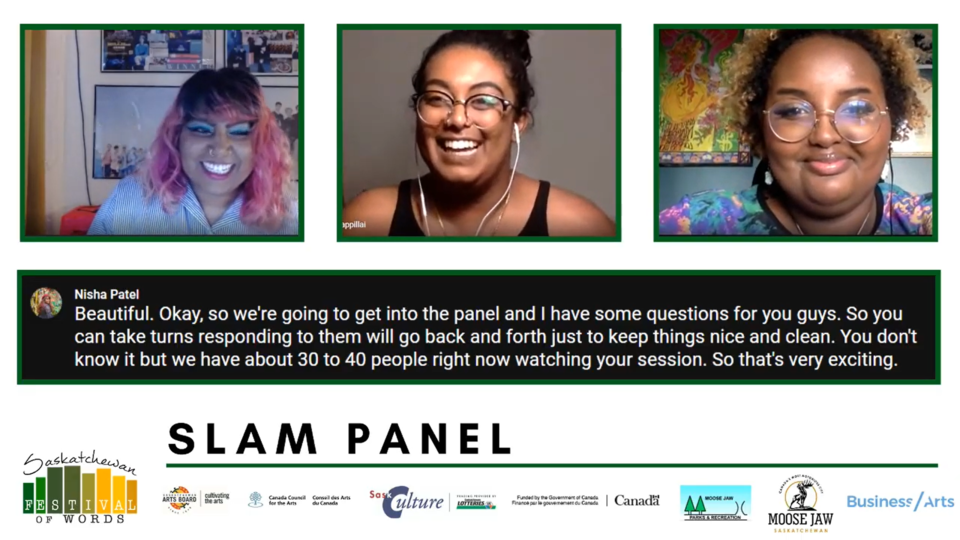The annual Slam Poetry Competition is an absolute staple of the Festival of Words weekend every year, looked forward to by poets and audience members alike, but the virtual format of the literary festival this year had organizers looking for another way to include the world of slam poetry in their events.
In place of the competition, the Festival instead hosted a Slam Panel with three Canadian poets who talked about the nature and experience of spoken word poetry in their respective cities.
With Edmonton poet laureate Nisha Patel moderating — and in some instances, sharing her input — Tamil-Canadian poet Namitha Rathinappillai in Ottawa and Somali-Canadian poet Amina Mohamed in Edmonton shared some of their work and answered some illuminating questions.
The history of spoken word poetry was an important topic the panel broached, as all three guests were people of colour and the form of spoken word historically comes from Black traditions.
For Mohamed, spoken word is something that she came to through her family’s history with the art form.
“Spoken word is so much of my history and my family’s history, and when i started to write it was just kind of a natural progression [and] it's just such a big part of me and my past and it's a place for me to tell my story that will last for the future and is also in the present,” said Mohamed.
The conversation turned to the nature of spoken word in comparison to written, or page, poetry. All three poets spoke about the form as being very personal, a space to share experience, trauma, and self.
“I think that element of presence is really to me what spoken word brings, versus page poetry,” said Rathinappillai. “I think especially when you hear poems, I just think there's something to be said about that kind of very personal connection.”
Patel pointed out that spoken word really can’t be done alone as it relies on the performance aspect, and both Rathinappillai and Mohamed agreed that in many ways, spoken word communities feel like more open spaces for diverse voices in comparison to the art of page poetry.
“It feels accessible because, at least in my experience, a lot of the times with page poetry you end up with a very white-centric space where you have folks that have the power to publish you or not publish you [and] it ends up leaving it up to consumption in a way I don't feel in spoken word,” said Rathinappillai. “[With spoken word] I don’t feel the need to dilute it or water it down the same way I often feel with page poetry.”
Mohamed agreed, adding her own experience in spoken word spaces.
“The community is so great and so welcoming, that's something you can’t always get with page poetry,” said Mohamed. “But when you're speaking to a group of people who look like you and sound like you at an open mic, it's way easier for you to do.”
The sense of community within spoken word scenes actually came up several times, with both Rathinappillai and Mohamed speaking to the responsibility of the poet to respect safe spaces when sharing their work — both to protect themselves from inner trauma and their audience from triggers.
Patel, the only panelist who has participated in more than just her home scene, shared that the spoken word and slam poetry scene across Canada is certainly unique in it's own way.
“I’ve toured across Canada and I know that each scene has its own kind of character, but there’s also similarities between scenes,” said Patel. “You always have these really young people doing really amazing work kind of across the board, and then you have these pillars of the community who come in and kind of help people, show them the ropes as they go, and
I think that's true of every community.”
As seems to be a trend during this year’s Festival, one viewer asked both poets if they keep the first drafts of poems that are born out or rawness or vulnerability, which prompted a fairly passionate “no” from both Rathinappillai and Mohamed.
“I’m maybe very millennial but I do all of my poetry on my laptop and I type it so I don't even have a paper copy of my first draft,” said Rathinappillai.
“For me, I think my poems are never finished and I’ll keep editing them months or years after they're made,” agreed Mohamed. “I’ll keep editing it until it's like, written down in a book and even then, I’ll probably get the book and annotate it in the margins.”
Sometimes, both poets agreed, changes can happen right before a performance, often based on comfort level or perception of the audience, or to create the aforementioned safe space for everyone at an event.
Both Rathinappillai and Mohamed agreed that they hope to see more spaces and supports created for BIPOC — Black, Indigenous, and people of colour — poets in the future, and encouraged people to support their local artists and poets in their city.
The Festival of Words continues until July 19, with a full schedule of events available here.
Stay tuned for coverage of the festival as it progresses through the week.




